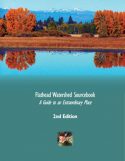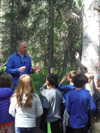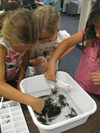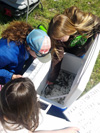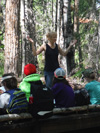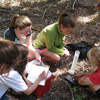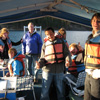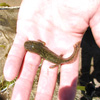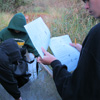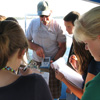Education Programs
The staff of WLI believes it is important to reach citizens of all ages in Whitefish and its surrounding communities about water ecology. Efforts in this area include providing outdoor educational programs for grades K-12, high school job shadow opportunities, college internships, graduate thesis support, presentations to civic groups, and annual education and stewardship awards.
K-12 Programs
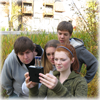
WLI hosts annual elementary school classes at our Living Wetlands Interpretive Nature Trail in the Averill’s Viking Creek Wetland Preserve. WLI owns and manages the property for water quality, wildlife value, public awareness, and enjoyment. WLI partners with Whitefish High FREEFLOW and the advanced chemistry class for field trips and participation in field studies, and participates in the high school job shadowing program.
Scholarships and Internships
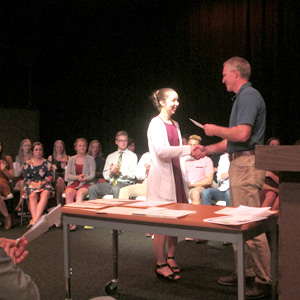
One important aspect of our educational programming is encouraging and mentoring students to follow their curiosity and continue their studies in environmental sciences. The Ripple Effect Scholarship Program exists to accomplish this goal.
The Ripple Effect Scholarship Program
BACKGROUND
The Ripple Effect offers three different types of scholarships. Upon learning of WLI’s plans to expand its education programming with more robust internship opportunities, long-time WLI members who share a great interest in advancing water quality and natural resource education, stepped up to the proverbial plate by providing funding for this program.
ELIGIBILITY CATEGORIES
1) High School Student Entering a Four Year University Majoring in Environmental Sciences
This scholarship is available to any Whitefish High School senior who is entering a four year university with plans to major in an environmental science field. Eligible majors include; environmental science/studies, environmental engineering, biology, and sustainability. Other majors will be considered if they demonstrate a link to an environmental emphasis.
Scholarship Amount: $500
Application: Cover Letter, WLI Application, Teacher Reference, Transcripts, Essay – Due April 15th
2) University Student Who Completes Limnology Internship at WLI
This scholarship will be awarded to an upper level university student who completes a successful internship with WLI during the course of a summer. This scholarship essentially serves as a stipend for the student toward their continuing education.
Scholarship/Stipend Amount: $2500
Application: Cover Letter, WLI Application or University Specific Intern Application, Professor Reference, Transcripts, Essay – Due March 15th
3) Graduate Thesis or Dissertation
Students with thesis proposals specific to Whitefish area water resources are encouraged to submit inquiries to WLI for consideration. Support to a thesis may be financial, advisory, and/or equipment to assist in their study design and execution.
Scholarship Amount: TBD
Application: Cover Letter, WLI Application, Thesis Study Plan, Graduate Committee Chair Reference
SOLICITATION
All scholarships will be advertised on the WLI website www.whitefishlake.org and in the quarterly newsletter LakeFront. The Whitefish School District will post the high school graduate scholarship. Teachers, professors and specific colleges and universities will be made aware of the Internship opportunity. Graduate thesis opportunities are communicated directly with university professors.
REVIEW PROCESS
Applications are available on the WLI website and applicants will be required to submit:
- A letter of recommendation from an instructor familiar with student’s work
- Official Transcripts
- A 300-500 Word Essay describing student’s watershed ethic and why their ethic will help them become a good watershed steward.
WLI staff will review applications and submit recommendations to the WLI Board of Directors for approval.
ANNUAL AWARDS
The number of awards issued annually will be based on the fund account balance and will range from zero to a maximum of three awards. No award category has more than one recipient annually.
PROGRAM SUSTAINABILITY
Initial funding came from an operational budget donation by members. On-going support will be requested through funding challenges and through grants. Funds are escrowed in a restricted account at the Whitefish Credit Union
Community Group Presentations

Upon request, WLI staff speaks to various civic groups ranging from the Rotary Club to private homeowners associations on regional issues related to lake ecology and the research underway at WLI.
Stewardship Awards
WLI is pleased to sponsor the Whitefish Lake Institute Stewardship Awards. Each year, the award recognizes individuals or groups that took extraordinary measures to protect water quality in the Whitefish area. Nominations for individuals and groups are accepted annually.
Past Individual and Group Stewardship Awardees
Stewardship recipients are recognized annually for their efforts in the prior year.
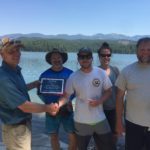
2020 Stewardship Award
Montana Fish, Wildlife & Parks (MFWP) AIS Team.
While Montana FWP has a statewide team working on the Aquatic Invasive Species (AIS) issue, a select group have gone out of their way to support the Whitefish AIS program. Tom Woolf and Zach Crete lead the Montana AIS program and have supported the partnership between the state and Whitefish AIS program. Larry Lytle repairs the state’s decontamination stations. Larry has kept our preventative decontamination station running. Russ Hartzell is the inspection station supervisor for western Montana and trains our local watercraft inspectors. Stacy Schmidt and Jayden Duckworth analyze the zebra mussel early detection samples WLI collects and are part of the Beaver Lake Dive Team that removes Eurasian Watermilfoil from Beaver Lake. Craig McLane heads the statewide early detection and monitoring program and is also on the Beaver Lake dive team. Ken Staigmiller is the fish health coordinatro for FWP and on the Beaver Lake Dive Team. Dave Landstrom and Dave Bennetts from MFWP, Region 1 (Parks Department) were honored for their partnership in fostering the establishment of an AIS watercraft inspection station at Whitefish Lake State Park and their on-going commitment to make the station successful.

2019 Stewardship Award
Craig Workman, Director of Public Works, City of Whitefish
Craig Workman was recognized for his leadership in planning for water resilience for the City of Whitefish. He worked closely with the Montana Department of Environmental Quality to ensure that reasonable and prudent growth can continue in the City while expansion work on the water treatment plant moves forward. Craig has also been instrumental in the pursuit of finding an alternative source of water for the City, working closely with consulting engineers in their mutual search for a viable groundwater source. These efforts along with leading the charge to reduce water loss throughout the City’s distribution system will help ensure a safe and reliable supply of potable water to the City for years to come. Craig is leading the charge to upgrade the City’s water treatment facilities to meet new requirements while controlling the burden on rate payers. Both the wastewater collection facilities and the treatment plant require improvements to make the system effective and capable of complying with new anticipated treatment standards. Under Craig’s leadership, the City Council adopted a Water Conservation Ordinance in May 2019 to address infrastructure challenges with peak summer month water demand. Lastly, the Public Works Department also partnered in the design, construction and funding of the Cow Creek Restoration Project.
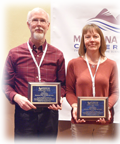
2018 Stewardship Award
Kris Tempel, Habitat Conservation Biologist, Montana Fish, Wildlife & Parks and
Alan Wood, Science Program Supervisor, Montana Fish, Wildlife & Parks
The 2018 award was presented to Kris Tempel, Habitat Conservation Biologist, and Alan Wood, Science Program Supervisor, two outstanding individuals from Montana Fish, Wildlife & Parks. Tempel and Wood worked together with the Trust for Public Land and Montana Department of Natural Resources and Conservation to complete the final phase of the Whitefish Lake Watershed Project. Years in the making, this collaborative conservation effort expands the Stillwater State Forest north of Whitefish by 6,380 acres and protects important fish and wildlife habitat, community water resources, public access and recreational opportunities while promoting sustainable forest management. This final phase completes the conservation of 13,398 total acres of privately owned timber land added to the Stillwater State Forest as public land to be sustainably managed by DNRC. This conservation project protects our local aquatic resources including important native bull trout and westslope cutthroat trout habitat, and large areas of Swift and Lazy Creek watersheds. Kris and Alan were awarded for their passionate and tireless work conserving fish and wildlife habitat and connectivity corridors at a landscape level in northwestern Montana – work that has been instrumental in the protection of the Whitefish Lake Watershed.
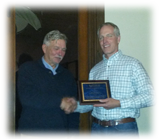
2017 Lifetime Achievement Stewardship Award
John Wachsmuth
Throughout his career at Montana Fish, Wildlife & Parks, John demonstrated his passion and commitment to protecting Northwest Montana natural resources. He leveraged management strategies through innovative collaborations with non-governmental partners, and worked with the general public to build community and awareness of natural resource issues. John made a lifetime of contributions to volunteer lake monitoring programs, protecting water quality, promoting watershed stewardship, and protecting Northwest Montana fisheries resources.
2016 Stewardship Award
Whitefish County Water & Sewer District
The Whitefish County Water & Sewer District (WCWSD) has loyally supported water quality initiatives in Whitefish for over thirty years. The WCWSD has sponsored numerous grants without which the Whitefish community would have far less information about the health of their water, and would have made far less progress toward improving water quality.
The community first benefited from a grant sponsored by the WCWSD to support the University of Montana Flathead Lake Biological Station’s Limnology of Whitefish Lake study by Golnar & Stanford in 1984. In 1986, a Department of Natural Resources & Conservation Renewable Resource Grant & Loan (DNRC RRGL) program grant sponsored by WCWSD allowed the Investigation of Septic Contaminated Groundwater Seepage as a Nutrient Source to Whitefish Lake which eventually led to the partial sewering of the East Lakeshore. The community again benefited from their sponsorship of funding for the 2003 Whitefish Lake Water Quality study by Craft, Stanford & Jackson. The WCWSD then sponsored a DNRC RRGL grant for the Whitefish Lake Institute’s Investigation of Septic Leachate to the Shoreline of Whitefish Lake in 2011, and both DNRC RRGL and Treasure State Endowment Program (TSEP) grants to conduct a Preliminary Engineering Report (PER) for the Lion Mountain neighborhood in 2015/2016. Most recently, the WCWSD once again sponsored a DNRC RRGL grant for a PER which will be completed in 2017 for the East Lakeshore neighborhood. The WCWSD also supported the development of the Living Wetlands Interpretive Nature Trail and makes annual contributions to support water quality monitoring on Whitefish Lake.
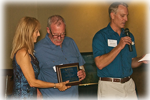
2014 Individual Stewardship Award
Brian Sullivan: Owner, F&H Surveying
Brian Sullivan’s life passion is on the water…paddling. He has been paddling kayaks and canoes, instructing rowing clinics, and organizing paddling events for as long as anyone in the Flathead can remember. Brian has dedicated many years of his life to teaching river safety, serving water-based recreationists, and organizing clean-up efforts on the Whitefish River. He organized and helped run the 69-mile Lake-to-Lake rowing race from Whitefish to Bigfork in the 1980s, and he raced in and volunteered for the Bigfork Whitewater Festival for many years.
Professionally, Brian and his crew have voluntarily collected survey data at City Beach since 2002. In partnership with Brian the Whitefish Lake Institute completed an analysis of the mean minimum and maximum water elevations along with associated statistics for Whitefish Lake spanning 58 years (1957-2014). Having clear and well justified mean low and high water elevations for Whitefish provides a clear jurisdictional boundary to serve our community into the future. Brian was recognized for all his hard work and dedication. Brian passed away in 2018.
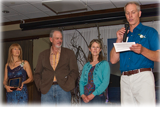
2014 Lifetime Achievement Stewardship Award
Dr. Jack Stanford: Director of the Flathead Lake Biological Station,
Jessie M. Bierman Professor of Ecology
Dr. Bonnie Ellis: Limnologist, Research Assistant Professor at the Flathead Lake Biological Station
Jack and Bonnie have helped protect the waters of Whitefish Lake, Flathead Lake and all waterbodies of the Flathead Basin through decades of collective research and advocacy. Jack became director of the Flathead Lake Biological Station in 1980 and has just announced his upcoming retirement. His groundbreaking research and educational efforts in freshwater ecology have taken him across the globe. Bonnie recently retired from the Flathead Lake Biological Station after dedicating the past 30 years to research in freshwater ecology, most recently as the lead author of a seminal report on the complex food web interactions in Flathead Lake for which Jack is also one of the authors.
Jack and Bonnie have consistently brought the weight of scientific evidence to bear on critical issues that affect our Flathead waterbodies, including trans-boundary issues, shallow aquifer dynamics, and nutrient cycling to name a few. Science provides the cornerstone of conservation, and Jack and Bonnie’s research has been invaluable in increasing our understanding of natural systems, and in enhancing our ability to protect them for future generations. To that end, together they have mentored hundreds of students who now contribute to water quality and watershed stewardship across the globe. The work that the Whitefish Lake Institute conducts locally rests atop the foundation that these two world class scientists have built through their tireless efforts.

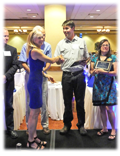
2013 Group Stewardship Award
Whitefish Legacy Partners
This year’s Group Stewardship Award recognized a unique collaboration—the Whitefish Legacy Partnership—for extraordinary measures to protect water quality in the Whitefish area. For the past 10 years, these partners worked tirelessly to create a community driven and donor supported legacy for the Whitefish area. Through their open dialogue and consensus building process, this group has forged a lasting and innovative solution to protect open space, recreational pursuits, working forests, and water and watershed protection over a broad landscape.
The City of Whitefish in partnership with Whitefish Legacy Partners proposed to the State Land Board to purchase permanent recreation and conservation easements on over 1,500 acres of school trust lands surrounding Whitefish Lake. The Land Board also approved a separate land banking transaction totaling 580 acres, which was proposed by Mike Goguen. The approval of both of these transactions contributes more than $10 million in revenue to state school trust beneficiaries – the schools and universities of Montana, without a single dollar of taxpayer money.
These partners created a new conservation and recreation-based revenue stream that supports healthy forests and timber production while providing public managed recreation, uncluttered views, wildlife habitat and high quality watershed value. We are thankful for conservation projects like these that create mutually beneficial outcomes for the Whitefish community and our natural resources. Although there were a number of people involved in this project, we honored the key players:
Lin Akey, Whitefish Legacy Partners: Lin was the first Whitefish Legacy Partners Chair and is President of Glacier Bank.
John Anderson, City of Whitefish: John is Whitefish Legacy Partner’s Vice Chair and a Whitefish City Councilor. He is co-founder of Conradi Anderson Law Firm.
Diane Conradi, Whitefish Legacy Partners: Diane is the former part-time executive director of Whitefish Legacy Partners and is co-founder of Conradi Anderson Law Firm.
Steve Frye, Montana Department of Natural Resources & Conservation: Steve is the Area Manager for DNRC’s northwest land office in Kalispell. This is after a 32 year career with the National Park Service with assignments in Glacier, Big Bend, North Cascades, and Yellowstone National Parks. Steve retired in 2006 as the Superintendent of Katmai National Park and Preserve in Alaska.
Mike Goguen, Whitefish Community Member: Mike has good instincts! With Mike as a managing partner, Sequoia Capital has helped give birth to companies that today represent more than 20 percent of the value of the entire NASDAQ stock market. They include some names you may have heard of like -Google, Yahoo! and YouTube. We’re fortunate that Mike’s business acumen and vision steers him to promising ideas and pressing needs in Whitefish. Mike’s philanthropic causes and local community investments has earned praise from the governor to the sheriff, and the mayor. Mike has given present and future generations the opportunity to connect with, appreciate, and protect the great outdoors. Mike, we are honored that you are part of our community and the conservation legacy we are building.
Fred Jones, Whitefish Legacy Partners: Fred is the Whitefish Legacy Partners Chair and a retired ski industry executive. He moved to Whitefish in 2004 to manage the Whitefish Mountain Resort, retiring in 2007.
Brian Manning, Montana Department of Natural Resources & Conservation: Brian has worked for the State of Montana DNRC for the past 26 years and is currently the Stillwater Unit Manager. The Stillwater Unit consists of approximately 118,000 acres of State School Trust Land including the Stillwater and Coal Creek State Forests. The DNRC goal is to manage the Montana’s trust lands to produce revenue for the trust beneficiaries while considering environmental factors and protecting the future income-generating capacity of the land.
John Muhlfeld, City of Whitefish: John is President of River Design Group and has served as Mayor of Whitefish since 2011. He has also been a board member of the Whitefish Lake Institute since 2010. John has been able to broker a balance between growth and resource protection in our small town through a maxim that community, commerce and corporate responsibility, when collective and cooperative, will empower a public to its fullest potential.
Heidi Van Everen, Whitefish Legacy Partners: Heidi is the Executive Director of Whitefish Legacy Partners. Heidi oversees the Whitefish Legacy Lands campaign to provide permanent public recreation and conservation, as well as continuing construction of the Whitefish Trail.
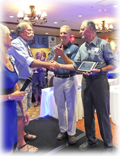
2013 Lifetime Achievement Stewardship Award
Dr. Lex Blood
Dr. Blood was recognized for his extraordinary dedication to conservation education and fostering collaborative partnerships in the Flathead Watershed and the Crown of the Continent His extraordinary participation at so many levels—from his early work as a geologist, through his distinguished formal and creative informal education careers, to the organization and founding of numerous effective partnerships—stands out far above the crowd of efforts in the community.
His passion for our natural world and kindness for its two-legged creatures has made him an exceptional mentor for so many people, including WLI’s Science & Education Director! The Flathead Watershed Sourcebook: A Guide to An Extraordinary Place and the Crown of the Continent Ecosystem: Profile of a Treasured Landscape came together under Lex’s guidance.
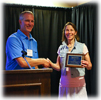
2012 Group Stewardship Award
Haskill Basin Watershed Council
The Haskill Basin Watershed Council (Steve Bryson, Paul McKenzie, John Phelps, Chester Powell, Rockett Van Wye) was recognized for streamside restoration work on Haskill Creek.
Through the years, the Haskill Basin Watershed Council has been a driving force to bring in grant money to study the water quality of Haskill Creek leading to an identification of areas in need of restoration. The first restoration project completed by the group involved bank stabilization and resulted in an 86% decrease in sediment loading to the stream. Its second restoration project and both projects included an educational component involving Project FREEFLOW high school students. The group is also recognized for working with the City of Whitefish on a water conservation management plan that minimizes wasted water at the water treatment plant, leaving as much water as possible in the stream for native westslope cutthroat trout.
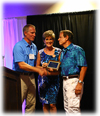
2012 Lifetime Achievement Stewardship Award
Jim & Lisa Stack
Jim and Lisa Stack were recognized for their passion and contribution to Whitefish Lake through their long service on the Whitefish Lakeshore Protection Committee. The Whitefish Lakeshore Protection Committee protects Whitefish Lake through the enforcement of lakeshore regulations. The intent of the regulations is to “protect the fragile, pristine character of Whitefish area lakes and the intertwined adjacent riparian and upland areas.” The committee ensures that long-term water quality is at the heart of the decision making process. It is, however, a sometimes difficult and controversial set of regulations to uphold, balancing the lake’s health and the needs and desires of a growing community.
Jim served on the committee for 20 years, chairing the committee from 1998-2012. Lisa served as a volunteer administrator for the committee for 16 years. Nobody has the institutional knowledge of the lakeshore regulations like Jim, and Lisa, and they have set the standard for current and future lakeshore committee members. We as a community owe them a deep level of gratitude for their passion and commitment to keep Whitefish Lake blue.
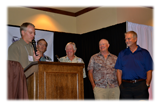
2011 Group Stewardship Award
The Point of Pines Communal Septic Treatment System
This award recognizes the development of a community wastewater system at the at the Point of Pines subdivision that benefits homeowners and the lake. It is an excellent example of collaboration between property owners, agencies and engineers to find a solution to water quality issues. The Point of Pines subdivision at the head of Whitefish Lake was originally platted in 1934. Located on a strip of land between the lake and State School Trust property, there are 21 homes in the subdivision—some older smaller homes and some newer, larger homes. With a lack of land to construct drainfields that would conform to today’s regulations, the older drainfields were placed next to the lake. Led by a long-time lakeshore property owner, a group of homeowners formed the Point of Pines Neighborhood Association with the purpose of funding the design and construction of a wastewater treatment system and purchasing an easement on which to locate the system. The system was designed and installed to serve all of the lots in the subdivision. The new system has the potential to reduce septic leachate issues for the lake now and long into the future. Bill Yunck and Scott Schmid were recognized for their efforts in representing the landowners, Michael Collins for his work on behalf of the DNRC, Bill Foley for voluntarily relinquishing a timber conservation easement for the system, and Tom Cowan for design and construction of the Point of Pines Communal Septic Treatment System
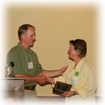
2010 Lifetime Achievement Stewardship Award
Sharlot Battin & Margaret Murdock
The mother/daughter duo of Margaret Murdock and Sharlot Battin owned about 250 acres of wetland habitat near the shores of Whitefish Lake—adjacent to the 30 acres of wetlands owned by the Whitefish Lake Institute—and have long been water quality advocates. In the 1980’s, long before the concept of conservation easements became popular, they placed their property in an easement through the Nature Conservancy. The easement restricts development but allows for traditional land use activities like timber harvest and agricultural practices. Through the years, Margaret and Sharlot have planted hundreds of trees and shrubs to provide wildlife habitat and to protect water quality. They have also provided browse protection to existing plants by fencing areas or by caging individual plants. Keen observers of the natural world, Margaret and Sharlot have documented the wildlife that lives or moves through their property. During their regular hikes, they have seen mountain lions, grizzlies, black bears, moose, deer, turkeys, owls, eagles, hawks, not to mention sensitive species like the LeConte’s Sparrow and Small Yellow Ladies Slipper.
The two women come from a matriarchal lineage of hard working, visionary women. Margaret’s mother, Bertha Reich, homesteaded in what amounted to nothing more than a tent that shielded her and her brother from the cold, windy eastern Montana winters near Winifred (Margaret and Sharlot also placed that 200 acre property into an easement). After marrying, Bertha and her husband, Hugo, bought the Whitefish property from George and Minnie Baker in 1930. Margaret likes the idea that “starting with Minnie, a man has never held the deed to this property.” The men did, however, work the land. Hugo raised oats, timothy and clover for livestock, something the Baker brothers had started in order to feed the horses for their logging operations. Margaret retired in 1985 after 36 years of teaching in Columbia Falls. She passed away in 2014. Sharlot made shoes for Broadway productions. She had recently retired after 25 years as an Instructor of footwear design, pattern making and construction at the Fashion Institute of Technology in New York City. Margaret’s and Sharlot’s steadfast protection of wildlife habitat and water quality earned them the Lifetime Achievement Stewardship Award and our great appreciation.
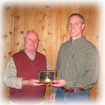
2008 Lifetime Achievement Stewardship Award
Bill Leonard
Retired from 3 careers including the Army, the railroad, and the Midwest Assistance Program, a non-profit organization that travels to rural communities to help them set up and finance water and sewer systems. In 1982, he spearheaded community efforts to establish the Whitefish County Water and Sewer District, the public entity that oversees water quality for the area. Two years later, Leonard helped get funding for the first water quality study of Whitefish Lake. He advocated for a second water quality assessment which was completed in 2003. His tireless efforts behind the scenes, writing and administering grants and serving on the Whitefish Water and Sewer District from its inception, earned him the respect and appreciation of those who knew or worked with him, and the 2008 Lifetime Achievement Stewardship Award.
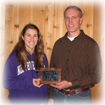
2008 Individual Stewardship Award
Kristi Whisler
Whisler’s study on the effects of fire retardant on the zooplankton in Whitefish Lake earner her he Grand Award 4TH Runner Up (t5th Place overall out of 50 competitors) at the Montana State Science Fair. In 2008, Whisler signed on as an unpaid intern at the Whitefish Lake Institute where she spent countless hours assisting in the collection of water quality samples. Whisler’s introduction to science started in her freshman year at Whitefish High School when she participated in Chris Ruffatto’s Project FREEFLOW program. Her high school science learning culminated with her science fair award as well as being a member of the team that took third place at the Montana Envirothon. Her depth of dedication in following the trail of water science earned her the 2008 Individual Stewardship Award.
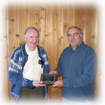
2008 Individual Stewardship Award
Kaare Hitland
For over 52 years, Kaare Hitland has been quietly protecting Whitefish Lake and his property on the lake. This do-it-yourself type of stewardship sprung from a simple and abiding love of his land and the lake. Hitland is one of the lake’s most senior residents, and from his first days on the lake, stewardship has ruled his actions. He and his wife Ruth designed their property to preserve as much natural vegetation as possible to protect the lake from surface runoffs and to use the existing plants as a way to filter sediments. Hitland went as far as building around one of his favorite trees, having dug out his foundation by hand. He never used fertilizers; lined the shoreline and storm drains with erosion control grasses and shrubs and reduced runoff from their yard with a steadfast refusal of impervious structures (driveways and sidewalks). He carried his beliefs onto the lake—instead of docks, he walked his boat in and out of the native plant shoreline on his property. He believed in shutting off his motor and drifting when he fished—in order to reduce pollution on the lake. His property—originally purchased because it reminded him and his wife of Norwegian fjords—is one of the best preserved on the lake and retains the original beauty that drew Hitland to the area. His personal philosophy and dedication earned him a 2008 Individual Stewardship Award and great appreciation from his follow community members.
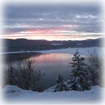
2008 Group Stewardship Award
Whitefish Lakeshore Protection Committee
For over three decades, the Whitefish Lakeshore Protection Committee worked diligently year round to ensure that local lakes have the highest quality of water possible. In 1974, locals Gene Hedman, Charlie Abell, Bob Brown and Frank Morrison traveled to Helena to testify with others for legislation to give local government tools to protect their lake resources. The legislation became Montana state law in 1975. The committee began work the next year. Since that time, countless citizens have served on the committee to ensure guidelines are followed that protect the natural beauty of the lake and the value of lakeshore property. The committee, its activities, its individuals, and its successes rarely receive accolades or recognition for the countless hours of time and energy that it takes to give back to the community. The committee members, past and present, were recognized with this Group Stewardship Award for their great efforts.
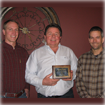
2008 Group Stewardship Award
Suncrest Homeowner’s Association
The Suncrest Homeowner’s Association’s restoration of a stream bed on their property proves what many stewards have long understood– that the natural state is often the most efficient and aesthetic way to protect water quality. For years, a little stretch of lakefront property owned by the homeowner’s association gobbled up lots of time for maintenance and mowing crews. Hoping that a purchase of native plants from the state nursery might help matters, Suncrest’s then-president Rodger Hawkins approached the native landscape company Forestation to help with ensure the native plants thrived. Forestoration assessed the stream bed at the site and found that it was altered some 50 years ago for an apple orchard. They suggested restoring the area with native plantings. Suncrest’s 74 lot owners approved the money—approximately $4,000—to improve the common area. Dogwood, willow, hawthorn, serviceberry, cottonwood and aspen were among the species planted in the area—native plants with deep roots systems that bind the soil and consume nutrients, keeping them out of the lake. Suncrest homeowners now enjoy a burgeoning beautiful songbird habitat that acts as a natural filter for the lake- and maintenance crews have far less work to do, saving the association money. The aesthetic, functional and practical advantages of this restoration project earned it this year’s Group Stewardship Award.
Past Chris Ruffatto Excellence in Education Awardees
WLI is proud to sponsor the Chris Ruffatto Excellence in Education Award—an avenue for recognizing and honoring educators (traditional and non-traditional) who dedicate their lives to engaging the next generation of environmental stewards.
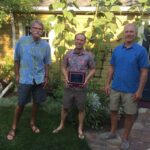
2019 Eric Sawtelle
Whitefish High School Science Teacher
The 2019 was awarded to Eric Sawtelle who has been involved in scientific discovery and science education since 1999. He is currently a Science Teacher at Whitefish High School where he took over the Flathead River Educational Effort for Focused Learning in Our Watershed program (Project FREEFLOW). He came to Whitefish after 8 years of teaching for the Kalispell School District where he taught Earth Science, Biology, and IB Environmental Systems and Societies. Eric worked with colleagues to develop inquiry-based science curriculums, and as a Freshman Academy faculty member to ensure a positive and successful experience for incoming freshman. He has continuously raised funds to obtain research equipment and conduct field trips for the enrichment of his students; and challenged his students to investigate current global issues through the empirical scientific model.
“Eric’s creative collaborations with fellow high school science teachers, elementary school teachers, and local organizations is beyond impressive,” noted WLI Science & Education Director, Lori Curtis. In addition to having his classes participate in important local conservation projects such as the long-time running Haskill Basin Monitoring and Restoration Project and the recent Cow Creek Monitoring and Restoration Project, Eric has found opportunities for his students to participate in projects as diverse as a long-term study of the North Fork of the Flathead River collecting water quality monitoring data, snorkeling to assess fish populations, conducting spatial and temporal snowpack studies, and studying microbial population assemblages. Eric has a MS in Secondary Science Education from MSU, Bozeman, and a BS in Ecology and Systematic Biology from Cal Poly. Eric is a truly dedicated and professional leader in education.
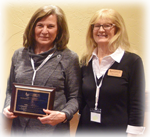
2018 Germaine White
Information and Education Specialist,
AIS Program Manager for the Confederated Salish & Kootenai Tribes
The 2018 award honors Germaine White who recently retired from her position as Information and Education Specialist & AIS Program Manager for the Confederated Salish & Kootenai Tribes. Germaine worked in the Division of Fish, Wildlife, Recreation and Conservation, Natural Resources Department where she has focused on environmental education and implementing outreach programs for diverse audiences. Germaine coordinated public involvement activities associated with the management of fish, wildlife and recreation; developed, produced and disseminated extraordinary educational materials, and represented her organization in numerous forms of media with brilliance and grace. She also developed and supervised the Aquatic Invasive Species program including inspection stations and education and outreach. Prior to her final position, Germaine worked as Cultural Resource Program Manager, Public Programs Manager, and held positions with The People’s Center, Salish Kootenai College, and the National Park Service. She published several articles and books, and is the recipient of numerous awards for her years of effort.
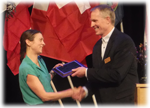
2017 Nicky Ouellet
Montana Public Radio Reporter
The 2017 Chris Ruffatto Excellence in Education Award was presented to Montana Public Radio reporter Nicky Ouellet at the Whitefish Chamber Annual Gala. Ouellet received this prestigious award for her extraordinary contribution to water quality education through her “SubSurface: Resisting Montana’s Underwater Invaders” podcast. The podcast—aired in 5 episodes during November and December of 2017—educated the public on scientists’ and resource managers’ efforts to understand and combat Aquatic Invasive Species (AIS). Nicky travelled to the mid-west—a hotbed for aquatic invasive mussels—to conduct research into this pressing and complex issue. Each 20 minute segment delves into lessons learned from communities where zebra mussels exist and discusses the challenge now faced by all Montanans to prevent this unwelcome invader from entering our aquatic systems. Her work to closely examine and describe for Montanans the increasing threat of AIS constitutes a breakthrough in public education on water quality issues. Nicky’s dedication supports those who work to prevent aquatic invasive species infestations, and community members who want to prevent them from our waters. Nicky’s prior work producing radio and web stories in northwest Montana has included excellent coverage on natural resource, land management, tribal, and political issues. Nicky now reports for Yellowstone Public Radio.

2016 Colleen Sullivan
Retired Whitefish Teacher
Colleen Sullivan dedicated nearly 40 years to her career as a biology and physical education teacher and coach for all three Whitefish district schools. She coached Whitefish High’s first volleyball team, was one of the first teachers to keep grades electronically, and was likely the first woman to teach science at Whitefish High. Colleen came to Whitefish in 1978 after two years of teaching in Baker, Montana. She was hired to teach PE at the high school that had lost its gym to a fire and it had not yet been rebuilt. A creative educator, Colleen was undeterred. She coached track from 1978 to 1984, volleyball in 1978, 1979, then from 2003 through 2008, and again in 2015. She began teaching biology in 1986 when classwork focused on plant and animal systems. Things changed significantly since then with students now learning on more of a molecular level. Again she employed her creativity in the classroom, which she attributes to a handful of former teachers who helped guide her along the way. Colleen retired in 2016 after an amazingly dedicated career in the Whitefish School District.

2012 Patti Mason
Education & Outreach Specialist/Watershed Coordinator
Flathead Conservation District
Patti was recognized for or her lifelong dedication to natural resource education. She has applied boundless passion and expertise from her early years as an instructor at Flathead Valley Community College in geology, earth science, environmental science, and physical geography—to her work as Earth Sciences Specialist for the Department of Natural Resources and Conservation, then as an environmental consultant for air and water quality—and finally in her current position as Outreach & Education Coordinator and Watershed Coordinator for the Flathead Conservation District. Since 2005, Patti has led the district’s efforts to sponsor educational initiatives that teach all ages about the importance of conserving our natural resources. She has hosted a plethora of workshops, festivals, events, trainings, presentations, and other educational efforts for K-12 students as well as adults.

2011 Chris Ruffatto
Retired High School Teacher
The Whitefish Lake Institute is proud to have named our new educational stewardship award in honor of Chris Ruffatto. Ruffatto is the first recipient of the award, recognizing his lifetime dedication to environmental education. Chris mentored thousands of students during his career as a high school educator. The award recognized him for always seizing the opportunity to involve young people in contemporary environmental issues and for challenging their thinking process by introducing them to innovative learning techniques. His extraordinary dedication to establish the Project FREEFLOW program and involving his students in the Montana Envirothon demonstrated his willingness to extend the classroom and engage the next generation of environmental stewards. We look forward to honoring future recipients of the Chris Ruffatto Excellence in Education Award.
Educator Resources
Flathead Community of Resource Educators (CORE)
The Flathead CORE is a network of individuals and organizations working together to increase awareness and understanding about the natural, historical and cultural resources of the Flathead Region. WLI has been a member of the Flathead CORE Watershed Education Committee since 2009. Through this relationship, WLI contributed content and reviews for the Flathead Watershed Sourcebook: A Guide to An Extraordinary Place which was authored, coordinated, and published in 2010 and a 2nd edition in 2017 by WLI’s Science & Education Director, Lori Curtis. The book was produced in print, is available on CD, and was developed into a complete website www.flatheadwatershed.org.
The Watershed Education Committee—in cooperation with Montana State University—also developed the Flathead Watershed Sourcebook Educators’ “Guide”. A companion curriculum to the Flathead Watershed Sourcebook, the Guide provides a set of engaging activities that enable educators to creatively introduce middle school students to resource conservation concepts while meeting Montana State curriculum standards.
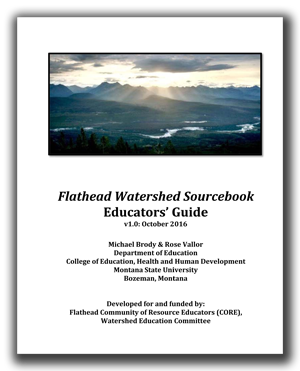
Flathead Watershed SourceBook – 2nd Edition
Beautiful 264 page book detailing the geography, cultures, natural history and economics of
the Flathead Watershed.
